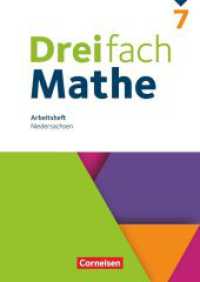- ホーム
- > 洋書
- > ドイツ書
- > Humanities, Arts & Music
- > Linguistics
- > general surveys & lexicons
Description
This book provides a comprehensive overview of current research in English for Specific Purposes (ESP) and its pedagogical implications. Bringing together contributions from diverse tertiary contexts, it showcases the vitality of ESP studies in the twenty-first century.
The volume highlights flourishing research themes and methodological innovations in ESP, while also engaging with closely related fields such as English for Academic Purposes and Professional English. Organized into three parts, it examines:
Established research areas revisited from fresh perspectives,
The integration and adaptation of well-known methodologies, and
New directions that expand the horizons of ESP inquiry.
Offering a state-of-the-art account of research and practice, the book illustrates how ESP scholarship continues to evolve and inform pedagogy worldwide. It will be of particular interest to graduate students, researchers, and practitioners seeking insights into both established and emerging trajectories within the field.
Foreword: What Is ESP and Where is it Taking Us? (Ken Hyland).- 1. Introduction: What has Changed in ESP in the 21st Century? (Elvan Eda Isik).- Part 1: Exploring New ESP Domains.- 2. New Digital Genres to Summarize Medical Research: Implications for ESP Teaching (María José Luzón).- 3. Navigating and Magnetizing the Online Audience in Digital Science Genres: The Case of TED Talks (Sichen Xia).- 4. English for Asylum Seekers and Refugees: Mapping the Needs of Absolute Newcomers (David Geneste).- 5. The Language of Creativity: ESP for Creative Practice and Creative ESP Practice (Darryl Hocking).- 6. English for Medical Interpreters: Empowerment through Technology and Innovation (Anna Kuzio).- Part 2: New Perspectives in ESP Needs Assessment and Curriculum Development.- 7. Conducting Needs Analysis Differently: Implications of Findings from Science Phd Students' Interviews (Nour El Houda Benlakhdar).- 8.Curriculum as Lived Experience: Designing an ESP Curriculum for Civil Aviation and Cabin Services (Hanife Tasdemir & Aysegül Daloglu).- 9.Data-Driven Learning and Writing in ESP: The Use of Interactive Metadiscourse Markers (Cemre Çiçek Tümer & Çiler Hatipoglu).- 10. Towards a Metaphorical Model in ESP Teaching (Octavia Raluca Zglobiu).- Part 3: New Perspectives in ESP Classroom Practices.- 11. Using Computer-Mediated Written Corrective Feedback Tools to Enhance Feedback Interaction in an EAP Class (Yusuf Cengiz & Nur Yigitoglu Aptoula).- 12. Developing an Emergent Engineering Identity: The Affordances and Constraints of Using Both Arabic and English (Rachel Hall Buck, Silvia Vaccino-Salvadore & Ahmad Bilal).- 13. Innovating the ESP Classroom and Developing Metacognitive Skills of Prospective Pilots Through Problem-based Learning (Gökhan Demirdöken & Nazmi Dinçer).- 14. English for Teaching Purposes? Exploring the English for Social Purposes and Cooperation Approach (Francisco Javier Palacios-Hidalgo & Cristina A. Huertas-Abril).
Elvan Eda Isik is an associate professor at the Department of Foreign Language Education at Middle East Technical University (METU), Türkiye. She received her PhD from METU and she was a visiting scholar at the Universities of Cambridge and Birmingham, UK. Her research interests are discourse analysis, corpus linguistics and applied linguistics for TESOL. Her research articles were published in international journals such as English for Specific Purposes, Journal of English for Academic Purposes and Lingua and she has co-edited the book (with Kenny, N. & Jiang, H.) English for Specific Purposes Instruction and Research: Current Practices, Challenges and Innovations, (2020, Palgrave Macmillan).
Darryl Hocking is an associate professor in the School of Social Sciences and Humanities at Auckland University of Technology, New Zealand. His primary research areas are discourse, genre, and corpus analysis, with a particular focus on the interactional genres and communicative practices in visual art settings and their impact on creative activity. His recent books include Communicating Creativity: The Discursive Facilitation of Creative Activity in Arts (2018), The Impact of Everyday Language Change on the Practices of Visual Artists (2022), and the edited volume The Language of Art and Artists (2025).








